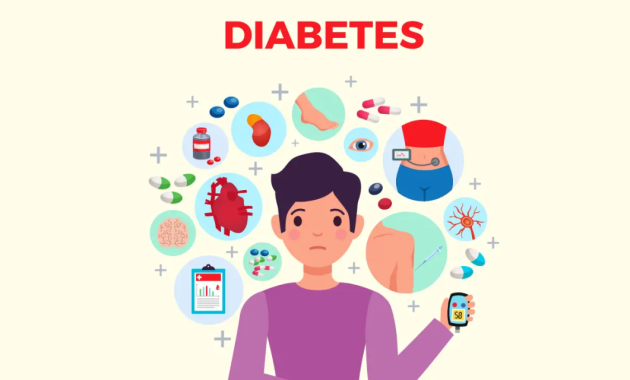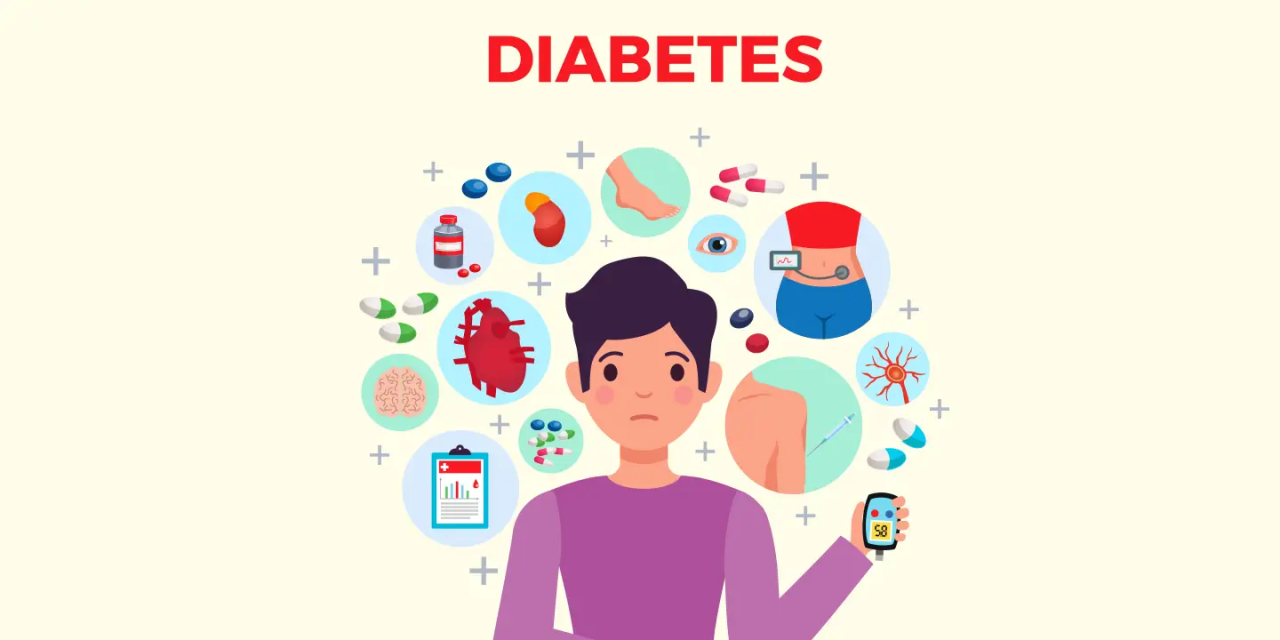
Diabetes at Work: Strategies for Peak Productivity Without the Crash
For millions of individuals, managing diabetes is a daily reality. But what happens when this condition intersects with the demands of the workplace? The truth is, navigating diabetes at work can be a significant challenge. Fluctuating blood sugar levels, the need for regular medication and meals, and the potential for complications can all impact a person’s ability to perform their job effectively. However, with the right strategies and support, individuals with diabetes can not only thrive in their careers but also achieve peak productivity. This article delves into practical approaches for managing diabetes at work, ensuring a fulfilling and successful professional life without the debilitating ‘crash’ often associated with uncontrolled blood sugar.
Understanding the Impact of Diabetes in the Workplace
The impact of diabetes at work extends beyond mere inconvenience. Poorly managed blood sugar can lead to a range of issues that directly affect productivity. These include:
- Fatigue: High or low blood sugar can cause extreme tiredness, making it difficult to concentrate and complete tasks.
- Cognitive Impairment: Fluctuations in glucose levels can affect cognitive function, leading to problems with memory, focus, and decision-making.
- Mood Swings: Blood sugar imbalances can trigger irritability, anxiety, and depression, impacting interactions with colleagues and overall job satisfaction.
- Physical Discomfort: Symptoms like headaches, blurred vision, and frequent urination can distract from work and reduce efficiency.
- Long-Term Health Complications: Uncontrolled diabetes can lead to serious health issues, such as cardiovascular disease, nerve damage, and kidney problems, which can further hinder productivity.
Recognizing these potential challenges is the first step toward implementing effective management strategies. Awareness and proactive planning are key to mitigating the negative effects of diabetes at work.
Creating a Supportive Work Environment
A supportive work environment is crucial for individuals with diabetes. This includes fostering open communication and providing reasonable accommodations.
Open Communication and Disclosure
Deciding whether or not to disclose one’s diabetes to colleagues and supervisors is a personal choice. However, sharing this information can be beneficial. It allows for:
- Increased Understanding: Colleagues and supervisors can better understand the reasons behind occasional absences or changes in behavior.
- Support and Flexibility: Open communication can facilitate the provision of necessary accommodations, such as flexible break times for monitoring blood sugar and taking medication.
- Reduced Stigma: Disclosure can help break down misconceptions about diabetes and promote a more accepting workplace culture.
It is important to note that employers are legally obligated to provide reasonable accommodations for employees with disabilities, including diabetes. This can include modifications to work schedules, allowing for breaks, and providing a private space for medication administration.
Reasonable Accommodations
Reasonable accommodations are adjustments to the work environment or job duties that enable an employee with diabetes to perform their job effectively. Examples include:
- Flexible Work Schedules: Allowing for adjustments to start and end times to accommodate meal times and medication schedules.
- Break Times: Providing regular breaks for blood sugar monitoring, medication, and snacks.
- Private Space: Designating a private space for insulin injections, blood glucose testing, and other diabetes-related tasks.
- Access to Food and Drink: Ensuring access to healthy snacks and beverages to manage blood sugar levels.
- Training and Education: Providing diabetes awareness training for colleagues and supervisors to foster understanding and support.
Employees should discuss their specific needs with their employers and explore available resources to ensure a supportive and inclusive workplace. The goal is to create a professional environment where people with diabetes at work can thrive.
Practical Strategies for Managing Diabetes at Work
Beyond workplace accommodations, several practical strategies can help individuals with diabetes at work effectively manage their condition and maintain high levels of productivity.
Blood Sugar Monitoring and Management
Regular blood sugar monitoring is essential for managing diabetes. This involves:
- Regular Testing: Checking blood sugar levels at the recommended times, as determined by a healthcare provider. This might be before meals, after meals, before and after exercise, and before bed.
- Record Keeping: Maintaining a log of blood sugar readings, medication dosages, food intake, and exercise to identify patterns and trends.
- Communication with Healthcare Provider: Regularly consulting with a doctor, endocrinologist, or certified diabetes educator to review blood sugar readings and adjust treatment plans as needed.
- Continuous Glucose Monitoring (CGM): Considering the use of a CGM device, which provides real-time blood sugar readings and alerts for high or low levels. This can be particularly helpful in preventing unexpected blood sugar fluctuations at work.
Effective blood sugar management is crucial for preventing complications and maintaining energy levels throughout the workday.
Meal Planning and Nutrition
Proper nutrition plays a vital role in managing diabetes. This includes:
- Balanced Meals: Eating meals that contain a balance of carbohydrates, proteins, and healthy fats.
- Portion Control: Practicing portion control to help regulate blood sugar levels.
- Healthy Snack Choices: Keeping healthy snacks on hand, such as fruits, vegetables, nuts, and yogurt, to manage blood sugar between meals.
- Meal Planning: Planning meals and snacks in advance to ensure consistency and prevent impulsive food choices.
- Hydration: Drinking plenty of water throughout the day to stay hydrated and support overall health.
Making informed food choices is key to managing diabetes at work and maintaining steady energy levels.
Medication Management
Adhering to the prescribed medication regimen is critical for controlling blood sugar levels. This involves:
- Taking Medications as Prescribed: Following the doctor’s instructions regarding medication dosages and timing.
- Setting Reminders: Using alarms or reminders to ensure timely medication administration.
- Carrying Medication: Keeping necessary medications readily available at work.
- Understanding Side Effects: Being aware of potential side effects of medications and reporting any concerns to a healthcare provider.
- Proper Storage: Storing medications correctly, as directed by a healthcare provider or pharmacist.
Consistent medication management is essential for preventing blood sugar fluctuations and maintaining overall health. People with diabetes at work should prioritize this aspect of their care.
Exercise and Physical Activity
Regular physical activity can improve insulin sensitivity and help manage blood sugar levels. This includes:
- Incorporating Exercise into the Workday: Taking short walks during breaks, using the stairs instead of the elevator, or participating in workplace fitness programs.
- Planning Regular Exercise: Scheduling time for exercise outside of work, such as brisk walking, jogging, swimming, or cycling.
- Monitoring Blood Sugar Before, During, and After Exercise: Adjusting medication or food intake as needed to prevent hypoglycemia (low blood sugar) or hyperglycemia (high blood sugar).
- Consulting with a Healthcare Provider: Discussing an appropriate exercise plan with a doctor or certified diabetes educator.
Exercise is a powerful tool for managing diabetes at work and enhancing overall well-being.
Stress Management
Stress can significantly impact blood sugar levels. Managing stress is therefore crucial for individuals with diabetes. This involves:
- Practicing Relaxation Techniques: Incorporating relaxation techniques, such as deep breathing, meditation, or yoga, into the daily routine.
- Taking Breaks: Taking regular breaks throughout the workday to de-stress and recharge.
- Setting Boundaries: Establishing clear boundaries between work and personal life to prevent burnout.
- Seeking Support: Talking to a therapist, counselor, or support group to manage stress and emotional well-being.
- Prioritizing Sleep: Getting adequate sleep to reduce stress and promote overall health.
Managing stress is not only beneficial for emotional well-being but also for effective diabetes at work management.
Resources and Support
Several resources and support systems can help individuals with diabetes at work manage their condition effectively.
- Healthcare Professionals: Consulting with a doctor, endocrinologist, certified diabetes educator, and registered dietitian for personalized care and guidance.
- Diabetes Education Programs: Participating in diabetes education programs to learn about self-management techniques and improve overall health.
- Support Groups: Joining support groups to connect with others who have diabetes, share experiences, and receive emotional support.
- Online Resources: Utilizing online resources, such as the American Diabetes Association (ADA) and the Centers for Disease Control and Prevention (CDC), for information and support.
- Workplace Wellness Programs: Participating in workplace wellness programs that offer diabetes education, screenings, and support.
Leveraging these resources can greatly enhance the ability of people with diabetes at work to manage their condition and thrive.
Conclusion: Thriving with Diabetes at Work
Managing diabetes at work requires a proactive and multifaceted approach. By understanding the impact of diabetes on productivity, creating a supportive work environment, and implementing effective management strategies, individuals with diabetes can achieve peak performance and maintain a fulfilling professional life. Remember, open communication, reasonable accommodations, and a commitment to self-care are key to navigating the challenges and embracing the opportunities that come with diabetes at work. Success is achievable with informed planning and consistent action.
[See also: Related Article Titles]

